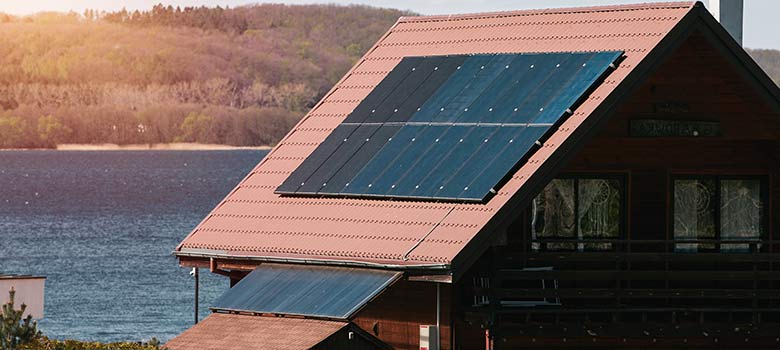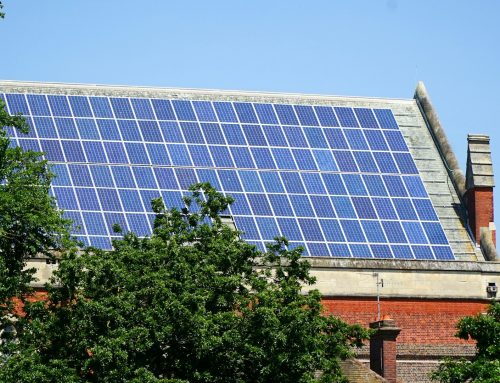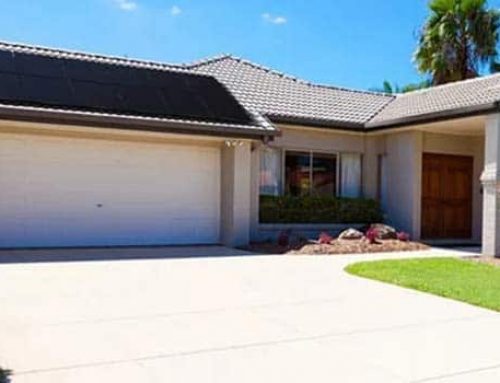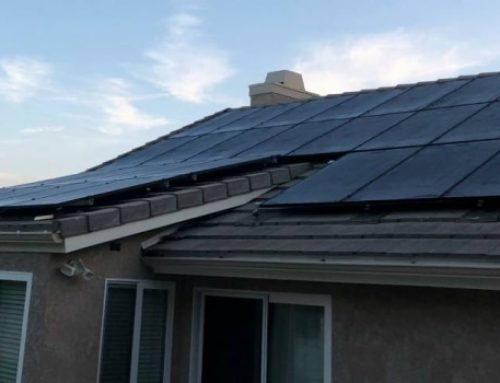This surge in solar panel installations isn’t just about joining a trend; it’s a smart choice for both the environment and the wallet.
But before Adelaideans can ride the wave of renewable energy, there’s a crucial aspect to consider: the roof requirements for solar panels.
In this guide, we’ll cover:
- Solar Panel Overview
- Matching Roofs to Solar Panel Requirements
- Key Installation Factors
- Compliance and Permits
- How to Choose The Best Installer
This might not be the first thing that comes to mind when thinking of renewable energy, but it’s undoubtedly one of the most important. Your roof is the foundation of your renewable energy system, and understanding its requirements is key to a successful installation.
In this article, we’ll dive into what makes a roof suitable for solar panels in Adelaide. We’ll explore factors like orientation, angle, and structural integrity, ensuring you have all the information needed to make an informed decision.
This isn’t just about putting panels on a roof; it’s about maximising efficiency and ensuring a safe, long-term investment in green energy.
Stay tuned as we illuminate the path to a brighter, more sustainable future, one rooftop at a time!
ENERGY BUSTER TIPS:
|
Solar Solutions: Tailored for Adelaide’s Rooftops
A Spectrum of Options
Understanding the different types of solar systems available is crucial in making an informed decision. From the traditional monocrystalline and polycrystalline panels to the more advanced thin-film and bifacial technologies, each offers unique benefits.
What Are the Best Types of Panels for Your Home?
Monocrystalline panels, known for their efficiency and sleek look, are ideal for homes with limited roof space. Polycrystalline panels, on the other hand, offer a balance between cost and efficiency.
Monocrystalline Panel Efficiency: What to Expect
For those seeking cutting-edge technology, thin-film and bifacial panels provide innovative alternatives, capturing sunlight more efficiently and even utilising reflected light.
Advantages: Bright and Sustainable
Firstly, renewable energy significantly reduces electricity bills. With Adelaide’s ample sunshine, panels can generate substantial energy, directly impacting energy expenses.
Secondly, renewable power is a green, renewable resource. By harnessing the sun’s energy, households and businesses reduce their carbon footprint, contributing to a healthier environment.
Additionally, panels can increase property value, making them a wise investment for the future.
Navigating the Challenges
Despite these benefits, it’s important to acknowledge the challenges. The initial cost can be a hurdle. However, various government incentives and rebates can help offset this.
Another challenge is ensuring the roof’s suitability. Factors like orientation, shading, and roof condition play critical roles in the system’s efficiency.
Professional assessments are vital in addressing these issues, ensuring that each installation maximises its potential.
Panels offer a promising path for Adelaide residents and businesses looking to reduce their environmental impact and energy costs.
The right choice of technology, coupled with a well-suited roof, can lead to a sustainable and economically sound investment.
The Perfect Fit: Matching Solar Panels to Adelaide Roofs
Essential Roof Conditions for Optimal Performance
The condition of the roof is paramount; it must be structurally sound to support the weight of the panels.
Older roofs or those in disrepair may require reinforcement or repair before installation. The material of the roof also plays a crucial role.
Panels can be installed on various materials, including tiles, metal, and even some flat roofs, but each material may require a different mounting approach.
Orientation and Size: Catching the Sun
The orientation and size of the roof are critical in determining the efficiency of the system. In Adelaide, north-facing roofs are ideal as they receive the most sunlight throughout the day.
East or west-facing roofs can still be viable options, albeit with slightly reduced efficiency. The size of the roof dictates how many panels can be installed.
Larger roofs offer more flexibility in the number and arrangement of panels, potentially leading to greater energy production.
Recommendations for Adelaide Conditions
Given Adelaide’s climate and average sun exposure, specific recommendations can enhance the performance of panels. A tilt angle of around 30 degrees is often ideal for maximising sun exposure year-round.
Using panels with higher heat tolerance is beneficial, as Adelaide’s summers can be quite hot, and the efficiency can decrease in higher temperatures.
For shading concerns, micro-inverters or power optimisers can be used. These devices allow each panel to operate independently, reducing the impact of shading on overall system performance.
It’s also recommended to regularly maintain and clean the panels to ensure they operate at peak efficiency.
What Is the Best Way to Clean Solar Panels: Adelaide Guide
The successful implementation of panels in Adelaide depends on a thorough analysis of roof conditions, orientation, and size. Tailoring the renewable power system to these factors ensures maximum efficiency and return on investment.
Key Factors in Solar Installation
Factor 1: Roof Orientation and Tilt
The orientation and tilt of your roof are pivotal in harnessing renewable energy efficiently in Adelaide. Ideally, panels should face north for maximum sun exposure.
If your roof doesn’t align perfectly north, don’t worry. East or west-facing panels can still capture significant sunlight, especially when optimised with the right tilt angle. The tilt of your panels is just as crucial as orientation.
In Adelaide, a tilt angle close to the latitude, around 30 to 35 degrees, is often recommended. This angle ensures that panels receive the most sunlight throughout the year, balancing between summer and winter sun positions.
However, not all roofs are created equal. For flat roofs, adjustable tilt frames can be a game-changer, allowing for angle optimisation.
In cases where the roof orientation or tilt is less than ideal, technology like tilt frames, along with efficient panel selection, can compensate, ensuring your system still performs effectively.
It’s about working with what you have and making smart adjustments where possible.
Factor 2: Shade and Environmental Conditions
Even a small amount of shade can significantly reduce the efficiency of your system.
In assessing your Adelaide property for installation, it’s crucial to consider potential shade sources like nearby trees, buildings, or even future constructions.
Seasonal changes in the sun’s path and the growth of foliage can alter shading patterns, so a thorough year-round assessment is beneficial.
Environmental conditions go beyond just shade. Adelaide’s climate, with its hot summers and mild winters, can affect the performance. High temperatures can reduce panel efficiency, so choosing panels with a high-temperature coefficient is wise.
Additionally, factors like dust, debris, and bird droppings can impact panel efficiency. Regular cleaning and maintenance are essential to keep your panels in top working condition, ensuring you get the most out of your investment.
Compliance and Permits
Understanding Australian Regulations
It’s not just about the technical fit but also about aligning with Australian regulations. These regulations ensure safety, reliability, and standardisation across all installations.
The Australian Clean Energy Council (CEC) outlines strict guidelines that must be followed. This includes using CEC-approved panels and inverters, and ensuring that installations are carried out by CEC-accredited installers.
These standards guarantee that your system is not only efficient but also safe and compliant with national standards.
The regulations cover aspects like system size, grid connection, and safety measures. Systems over a certain size may need additional approvals, and all systems must be designed and installed to handle Adelaide’s specific environmental conditions.
Compliance with these regulations is crucial not just for the smooth functioning of your system but also for eligibility for government rebates and incentives, which can significantly offset the initial installation costs.
Permits and Approvals in Adelaide
In addition to national regulations, there are local permits and approvals to consider in Adelaide. Before installation, it’s important to check with your local council for any specific requirements or restrictions.
This might include building permits, especially for heritage-listed properties or areas with specific building codes. In some cases, your installer can handle these permits and approvals, streamlining the process for you.
Connecting your solar system to the grid requires approval from SA Power Networks, the electricity distributor in South Australia. This ensures that your system is correctly integrated into the grid and meets all safety and performance standards.
Connecting Solar Panels: What’s the Process and What Should You Expect?
This approval is essential for systems that plan to feed excess energy back into the grid, a common practice that can further reduce electricity bills.
Navigating these regulations, permits, and approvals may seem daunting, but they are crucial steps in ensuring a successful and compliant solar installation in Adelaide.
Working with knowledgeable and accredited professionals can make this process smooth and hassle-free, allowing you to enjoy the benefits of renewable energy without any legal hiccups.
Powering Up with Professionals: The Key to Success
The Importance of Professional Assessment and Services
A professional assessment provides a comprehensive evaluation of your specific situation, taking into account factors like roof condition, orientation, potential shading, and energy needs.
This tailored approach ensures that your system is not just installed, but optimized for maximum efficiency and longevity.
Professional services guarantee compliance with all regulations and standards. Certified installers are well-versed in the latest industry standards and local regulations, ensuring that your installation is up to code.
They also handle the necessary paperwork for permits and approvals, providing a hassle-free experience. These services often include after-installation support, like maintenance and monitoring.
Choosing the Best Provider: A Checklist
- Accreditation and Certification: Ensure the provider is accredited by the Clean Energy Council (CEC). This accreditation is a testament to their adherence to industry standards and regulations.
- Experience and Reputation: Look for a provider with a solid track record in Adelaide. Check customer reviews and testimonials to gauge their reputation and reliability.
- Technical Expertise: Choose a provider with expertise in the latest technologies and who offers a range of options tailored to Adelaide’s climate and conditions.
- Comprehensive Assessment Services: Opt for a provider who conducts thorough site assessments. This indicates a commitment to tailoring the solution to your specific needs.
- Transparent Pricing and Quotations: A reputable provider offers clear, upfront pricing and detailed quotations, helping you understand what you’re paying for.
- Warranty and Support: Check the warranty offered on both the products and the installation work. Post-installation support, like maintenance services, is also important.
- Local Knowledge: A provider with local knowledge will be more adept at handling Adelaide-specific regulations and environmental conditions.
- Consultative Approach: The best providers take the time to understand your needs and educate you about your options, rather than just pushing a sale.
How to Choose the Best Solar Company in Adelaide
By choosing the right professional provider, you not only ensure a smooth and compliant installation but also maximise the return on your investment.
Your Pathway to a Brighter Future
Let’s revisit the key insights that can light the way to a sustainable and efficient journey:
- Roof Essentials: Ensure your roof is structurally sound, with optimal orientation and minimal shading.
- Solar Panel Types: Choose from monocrystalline, polycrystalline, thin-film, or bifacial panels based on your needs.
- Advantages and Challenges: Embrace the environmental and economic benefits while navigating initial costs and installation challenges.
- Tailored Systems: Consider Adelaide’s specific conditions for system size, tilt, and technology.
- Regulatory Compliance: Adhere to Australian and Adelaide-specific regulations, permits, and approvals.
- Professional Expertise: Engage with accredited professionals for assessments, installation, and maintenance.
Remember, each project in Adelaide is unique, reflecting the diverse needs and conditions of each property. It’s not a one-size-fits-all solution; rather, it’s a tailored approach that requires careful consideration and expert guidance.
Before making your decision, consider:
- Your property’s specific characteristics.
- The range of options available.
- The importance of complying with regulations and standards.
We encourage you to consult with a professional provider to ensure your installation is not just compliant but also optimally tailored to your needs. Embrace the power of the sun and take a step towards a more sustainable, energy-efficient future in Adelaide.
Ready to Shine? Contact Energy Buster Today!
Are you feeling inspired to harness the power of the sun and make a positive change in your Adelaide home or business? The journey to a more sustainable and cost-effective future is just a call away.
Contact Energy Buster for personalised advice tailored to your unique needs. Our team of experts is ready to provide you with a detailed assessment and a no-obligation quote, guiding you through every step of your journey.
- Personalised Advice: Get expert guidance based on your specific requirements.
- Customised Quotes: Receive a tailored quote that aligns with your energy needs and budget.
- Professional Expertise: Benefit from our team’s extensive knowledge and experience.
Don’t miss this opportunity to transform the way you use energy. Reach out to Energy Buster today and take the first step towards a brighter, greener, and more efficient future.






